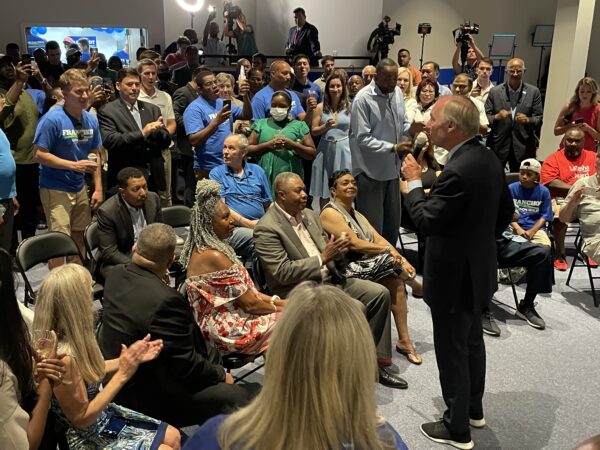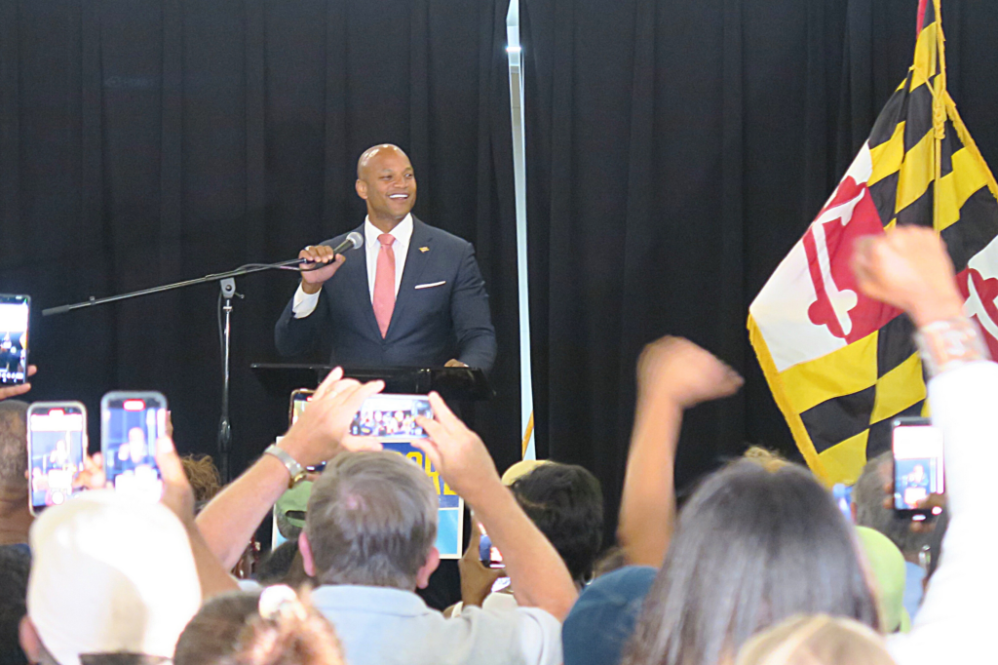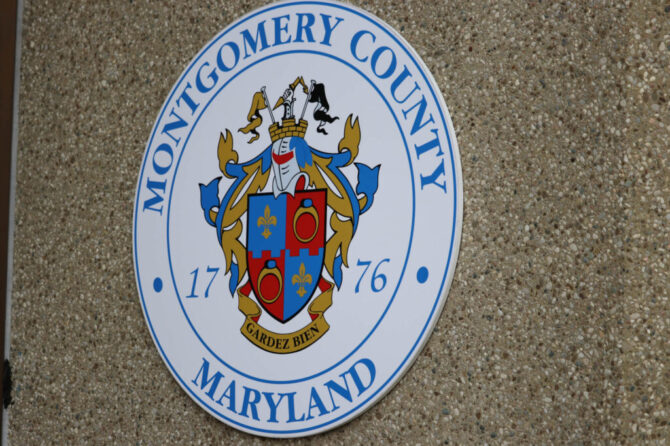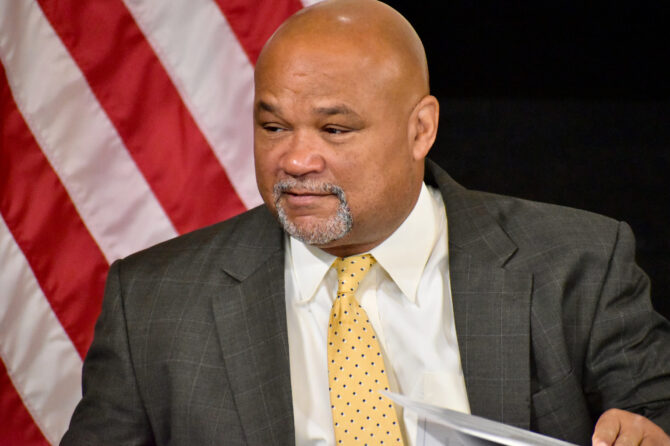Best-selling author and former foundation executive Wes Moore, who began his long-shot pursuit of the Democratic gubernatorial nomination in single digits, catapulted into the lead on Tuesday as the first wave of ballots were counted.
With early-voting ballots counted and 1,958 of 2,074 precincts reporting primary day ballots, Moore and his running mate, former state Del. Aruna Miller, had 37% of the primary vote.
Former U.S. Labor Secretary Tom Perez, a former Maryland Labor Secretary and Montgomery County Council member, had 27%. He and his running mate, former Baltimore City Council member Shannon Sneed, trailed Moore and Miller by about 34,000 votes.

Democratic gubernatorial candidate Peter Franchot, Maryland’s four-term comptroller, addresses supporters at his campaign headquarters on Tuesday. Photo by Bruce DePuyt.
Comptroller Peter Franchot, the state’s four-term tax collector, fell short of expectations. The consensus frontrunner since launching his campaign over a year ago, Franchot and his running mate, former Prince George’s Council member Monique Anderson-Walker, pulled in just 20% of the vote, with 94% of precincts across the state and all early voting centers reporting.
The half-dozen other Democrats running posted in the low single digits.
Moore’s commanding lead, which must survive a mail-in vote count process that is expected to last many days, represented an enormous validation of the endorsement- and charisma-fueled campaign waged by the decorated military veteran and non-profit CEO.
There were more than 168,000 mail-in ballots from Democratic voters returned to election officials as of Monday, enough to overtake any current lead, and the Franchot and Perez camps encouraged voters and the public to be patient and wait for complete information. Many additional mail ballots were likely returned on Tuesday; elections officials will begin counting those ballots on Thursday morning.
Nevertheless, the Moore campaign hosted a joyous event with a couple hundred supporters at The Garage at R House in North Baltimore’s Remington neighborhood on Tuesday night.
Around 11 p.m., Moore, 43, appeared on a small stage, an American flag on one side, the Maryland flag on the other, to cheers and an enthusiastic round of applause.
Moore, a Baltimore resident, beamed.
“What’s going on, everybody?” he said, as the crowd cheered louder.
“We are feeling good, we are feeling strong. We are winning,” Moore said. “And I tell you we’re feeling really good right now because we are sitting in a room of believers.”
While parts of his 21-minute-long remarks sounded as if it could have been a victory speech, it was not.
“There won’t be any announcements made tonight,” he told the crowd. “But I can tell you right now, it’s because we believe in counting every vote. Our campaign, our party, we believe in counting every vote.”
Moore thanked his volunteers and campaign workers before turning to his lieutenant governor candidate.
“A big shout out to the best running mate anyone could have possibly ever asked for — Delegate Aruna Miller,” he said.
Miller, 57, is a former two-term member of the Maryland House of Delegates from District 15 in Montgomery County.
“With your help, Aruna is not just going to be the next lieutenant governor in this state; she is going to be the most consequential lieutenant governor in this country, and you can mark my words on that,” Moore said.
He then thanked his wife, Dawn Moore, “the pretty lady over there in the orange dress.” His mother, Joy Moore, also was present.
“There still a lot of votes to be counted, but I do know this, for each and every one of you here, be proud of tonight. Be proud of tonight because we are on pace to win this thing,” he said.
Moore was originally scheduled to speak as early as 9:30 p.m., but that time came and went as the crowd swelled. Finally at about 10:15 p.m., Cheryl Bost, president of the Maryland State Education Association, which endorsed Moore for governor, giving his candidacy a huge boost, took to the stage to introduce some of the elected officials who had assembled and rally the crowd.
“We have faith in Wes Moore as the next governor,” Bost said to cheers.
Blaring recorded music started again as members of the crowd sipped an occasional cocktail or beer, snacked on meatballs, sampled the cheese tray and small chocolate treats. A few supporters rocked back and forth, not quite dancing.
At about 10:45 p.m., U.S. Rep. C.A. “Dutch” Ruppersberger, a Baltimore County Democrat, spoke briefly the crowd, followed by U.S. Rep. Kweisi Mfume.
“I know it’s still early, but I’m an optimist,” Mfume said. “Tonight I am very, very optimistic.”
Both of the Maryland General Assembly’s presiding officers — Senate President Bill Ferguson and House Speaker Adrienne A. Jones, both of whom had endorsed Moore — each then spoke to the crowd.
Moore has been dogged by charges that his personal story has on occasion been exaggerated and enhanced — and in some cases, recounted as factually incorrect — and that he has not bothered to set the record straight in interviews when others have gotten it wrong.
He has denied that he deliberately misled anyone.
Among the oft-repeated factual mistakes is that he was born and grew up in Baltimore, as was the case with a young man of the same name with whom he contrasts his own life in his best-selling autobiography, “The Other Wes Moore: One Name, Two Fates.”
That Wes Moore, who did grow up in Baltimore, is now serving life in prison without the possibility of parole for his participation in the murder of Bruce A. Prothero, an off-duty Baltimore County police sergeant working as a security guard who was shot to death during the robbery of a jewelry store in Pikesville.
The gubernatorial candidate Wes Moore was born in a Washington, D.C., hospital and reared in Takoma Park, before he and his family moved to the Bronx, New York, when he was 3, after his father died. Moore did end up in Baltimore when he attended and graduated from Johns Hopkins University.

Former U.S. and Maryland Labor Secretary Tom Perez, alongside his lieutenant governor running mate Shannon Sneed, addresses supporters in Bethesda on primary election night. Photo by Nene Narh-Mensah.
Even with Moore’s mounting lead, other Democratic candidates remained optimistic Tuesday night.
“We’re getting almost 50% of the vote in Montgomery County,” Perez told supporters who gathered at a rooftop bar in Bethesda. He said the campaign was optimistic it could close the gap between election night results as mail ballots begin to be counted on Thursday.
Perez said he was particularly encouraged because the push to get out the vote by his campaign and the labor unions who backed him included a push for mail-in ballots.
“We are ready for Thursday the canvas begins, and that’s going to be an arduous process,” Perez said. “…As someone who’s done voting rights work, I have been very, very conscious of the fact that every eligible person should have the right to vote, and all those properly cast votes can be counted.”
Perez added that part of the reason his supporters couldn’t celebrate Tuesday night was term-limited Republican Gov. Lawrence J. Hogan Jr.’s decision to veto a bill that would have allowed for early ballot canvassing.
“That is that is not good governance,” Perez said. “…When Mississippi and Texas do it better than we do, you know, you’re in trouble.”
He encouraged supporters to be patient and wait for more election results.
Franchot also assured supporters at his campaign headquarters in Bowie that when all the votes are counted, he would emerge on top. And he cautioned his rivals: “Make sure you don’t celebrate too early.”
“When it’s all said and done, at the end of the day, we’re going to be in a much better position than we are today,” he said. “So stay tuned.”
Despite his brave talk, Franchot’s remarks lacked conviction, and his supporters appeared to recognize that he had come up short. After shaking hands with staffers and volunteers, Franchot moved toward the door. He paused for several seconds in front of a large TV monitor showing news coverage of the race. The results showed Moore well in front.
Photo: Democratic gubernatorial candidate Wes Moore addresses supporters at an election night party in Baltimore. Photo by William F. Zorzi.










